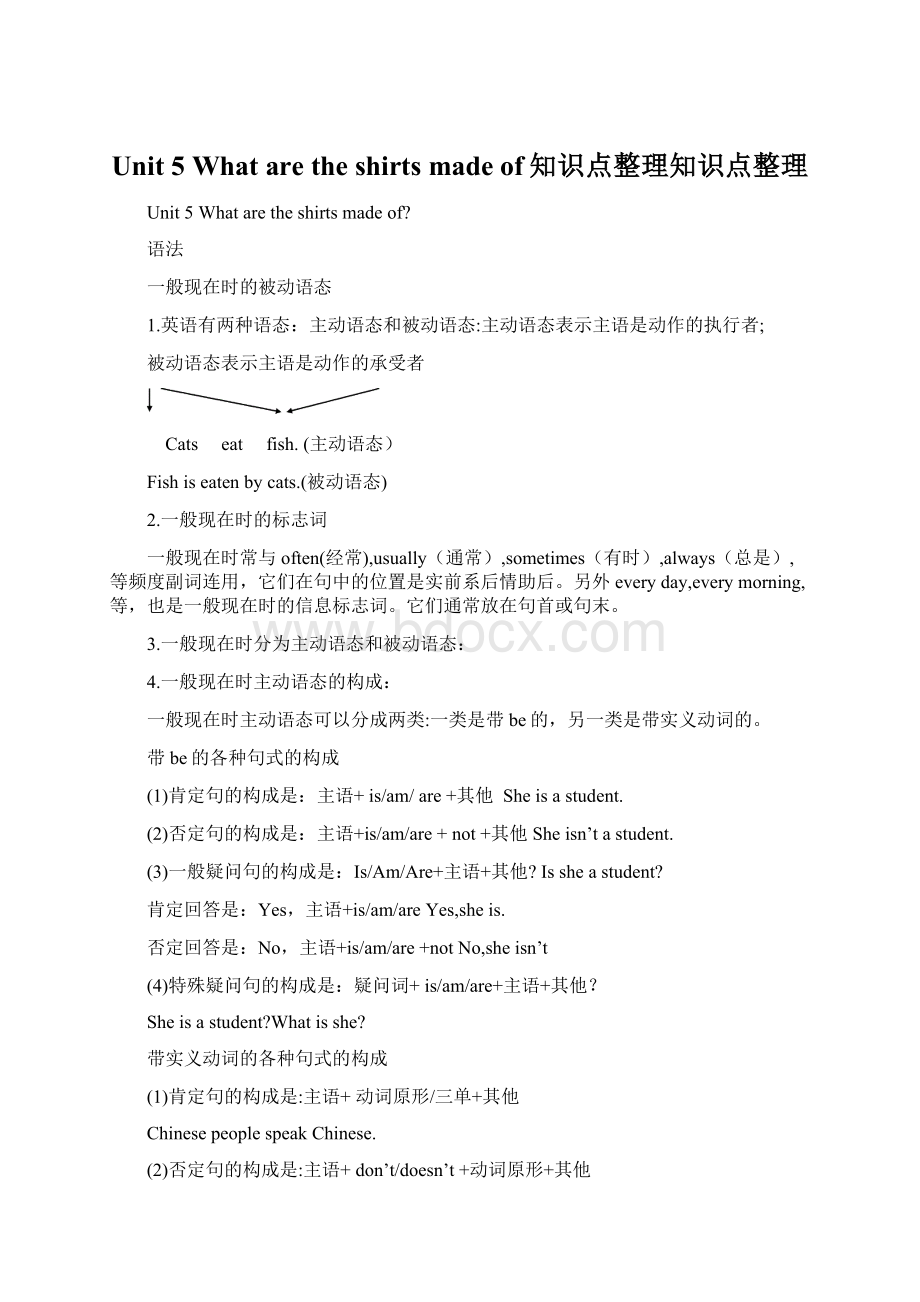Unit 5 What are the shirts made of知识点整理知识点整理.docx
《Unit 5 What are the shirts made of知识点整理知识点整理.docx》由会员分享,可在线阅读,更多相关《Unit 5 What are the shirts made of知识点整理知识点整理.docx(10页珍藏版)》请在冰豆网上搜索。

Unit5Whataretheshirtsmadeof知识点整理知识点整理
Unit5Whataretheshirtsmadeof?
语法
一般现在时的被动语态
1.英语有两种语态:
主动语态和被动语态:
主动语态表示主语是动作的执行者;
被动语态表示主语是动作的承受者
Cats eat fish.(主动语态)
Fishiseatenbycats.(被动语态)
2.一般现在时的标志词
一般现在时常与often(经常),usually(通常),sometimes(有时),always(总是),等频度副词连用,它们在句中的位置是实前系后情助后。
另外everyday,everymorning,等,也是一般现在时的信息标志词。
它们通常放在句首或句末。
3.一般现在时分为主动语态和被动语态:
4.一般现在时主动语态的构成:
一般现在时主动语态可以分成两类:
一类是带be的,另一类是带实义动词的。
带be的各种句式的构成
(1)肯定句的构成是:
主语+is/am/are+其他Sheisastudent.
(2)否定句的构成是:
主语+is/am/are+not+其他Sheisn’tastudent.
(3)一般疑问句的构成是:
Is/Am/Are+主语+其他?
Issheastudent?
肯定回答是:
Yes,主语+is/am/areYes,sheis.
否定回答是:
No,主语+is/am/are+notNo,sheisn’t
(4)特殊疑问句的构成是:
疑问词+is/am/are+主语+其他?
Sheisastudent?
Whatisshe?
带实义动词的各种句式的构成
(1)肯定句的构成是:
主语+动词原形/三单+其他
ChinesepeoplespeakChinese.
(2)否定句的构成是:
主语+don’t/doesn’t+动词原形+其他
Chinesepeopledon’tspeakChinese.
(3)一般疑问句的构成是:
Do/Does+主语+动词原形+其他?
DoChinesepeoplespeakChinese?
Yes,theydo.No,theydon’t
肯定回答是:
Yes,主语+do/does.
否定回答是:
No,主语+don’t/doesn’t
(4)特殊疑问句的构成是:
疑问词+do/does+主语+动词原形+其他?
?
ChinesepeoplespeakChinese.WhatlanguagedoChinesepeoplespeak?
5.一般现在时被动语态的构成:
主语+is/am/are+动词过去分词+by短语+其他
ChineseisspokenbyChinesepeople.
(1)否定句的构成是:
主语+is/am/are+not+动词过去分词+by短语+其他
Chineseisn’tspokenbyChinesepeople.
(2)一般疑问句的构成是:
Is/Am/Are+主语+动词过去分词+by短语+其他
IsChinesespokenbyChinesepeople.Yes,itis.No,itisn’t
肯定回答是:
Yes,主语+is/am/are
否定回答是:
No,主语+is/am/are+not
(3)特殊疑问句的构成是:
疑问词+is/am/are+主语+动词过去分词+by短语+其他
ChineseisspokenbyChinesepeople.
WhoisChinesespokenby?
(1)Peopleusestampsforsendingletters.(改为被动语态)
Stampsforsendinglettersbypeople.
(2)WeusearecorderinourEnglishclass.(改为被动语态)
ArecorderinourEnglishclassby.
(3)Oneoftheclassroomisoftencleaned.(改为否定句)
Oneoftheclassroomoften.
(4)Thiskindofpaperismadeofwood.(就画线部分提问)
thiskindofpaperof?
(5)Thisorphanistakencareofbyanoldlady.(改为一般疑问句)
thisorphancareofbyanoldlady?
(6)—Isitusedforcuttingthings?
—.
A.Yes,itisB.No,itisC.Yes,itisn’tD.No,itused
(7)ThiskindofbikeinSuzhou.
A.ismade B.makes C.ismaking D.made
(8)___________teaplantsgrowninHangzhou?
A.Do B.Did C.Is D.Are
(9)Englishisusedmostpeopleintheworld.
A.forB.asC.byD.to
(10)Newcomputersallovertheworld.
A.isusedB.areusingC.areusedD.haveused
SectionA
1.由bemade构成的短语:
(1)bemadefrom意为“由……(原料)制成”,表示某物品制成后,已看不出原材料是什么,原材料在制作过程中已起了化学变化;
Paperismadefromwood.Wineismadefromgrapes.
(2)bemadeof意为“由……(原料)制成”,表示某物品制成后,仍可看得出原材料,其原料在制作过程中仅起了物理变化。
Thedeskismadeofwood.Theshoesaremadeofcloth.
(3)bemadein+地点意思是“在……(地点)被制造”,介词in后接产地。
ThiskindofcomputerismadeintheUSA.
ThisprintingmachinewasmadeinBeijing.
(4)bemadeby+某人意思是“由……制造”,介词by后跟动作的执行者。
ThismodelshipismadebyUncleWang.
(1)Thiskitepaper.
(2)Paperwood.
(3)Themachinestheworkers.
(4)Thecakeeggsandflour.
(5)Theoldbridgestone.
(6)Thiskindofdrinkapple.
(7)ThiskindofwatchShanghai.
(8)Mysweaterwool.
2.leaf为可数名词,意为“叶子”,复数形式是leaves。
shelf-shelves(架子)thief-thieves(小偷)knife-knives(刀)life-lives(生命)
wife-wives(妻子)
3.famous是形容词,意为“著名的,有名的”同义词是known,反义词是unknown
(1)befamousfor=beknownfor“因……而出名”
ChinaisfamousfortheGreatWall.
(2)befamousas=beknownas“作为……而出名”
MichaelJacksonisfamousasasinger.
(1)We’llhavedinneratQianxilongRestaurant,whichisfamousitsseafood.
A.ofB.toC.forD.as
(2)LuXun(鲁迅)wasfamous______awriter.
A.for B.as C.of D.with
4.区分like/suchas和forexample
(1)like做介词,意为“像……”,用来列举同类人或物中的几个例子,后面不能有逗号,相当于suchas
Therearemanykindsoffruitinthesupermarket,like/suchasapples,bananasandpears.
(2)forexample意为“例如”,列举同类人或物中的一个例子,其后要用逗号隔开。
I’dliketokeepapet,forexample,acat.
(1)Manyheroesarereadytohelpothers,LeiFeng,.
A.suchasB.likeC.forexampleD.example
(2)Manygirlslikered,AnnandLucy.
A.thatisB.forexampleC.namelyD.suchas
5.widely是副词,意为“广泛地,普遍地”,修饰动词。
Englishiswidelyusedintheworld.
6.asfarasIknow意为“据我所知”。
其中作从属连词,asfaras意为“就……来说”,引导状语从句,强调程度或范围。
AsfarasIknow,hehasbeenabroad.
7.grow意为“种植”或“生长”。
过去式和过去分词是grew,grown.短语growup意为“长大”
They’regrowingrice.
IwanttobeateacherwhenIgrowup.
8.byhand意为“用手”Theshoesaremadebyhand.
Thispairofshoeshand,anditverycomfortable.
A.ismadewith;isfeltB.aremadefrom;isfelt
C.aremadeof;feels.D.ismadeby;feels
9.Itseems/seemedthat…意为“似乎是……”(相当于“从句的主语+seem+todo”)
Itseemedthathewouldneverbeabletoworkoutthequestion.
Itseemsthatheisright=Heseemstoberight.
thattheyhaven’tknownthenews.
A.ItseemsBItseemedC.TheyseemD.Theyseemed
10.allovertheworld=aroundtheworld意为“全世界,世界各地”
Ourfriendsareallovertheworld.
11.与good相关的常见搭配
(1)begoodat意为“擅长”=dowellinIamgoodatmath.=Idowellinmath.
(2)begoodfor意为“对…有益”反义词组是bebadfor“对……有害处”
Swimmingisgoodforourhealth.
(3)begoodto意为“对…好”=befriendlytosb=bekindtosb
Sheisgoodtous.
MissReadisgood____music.Shecanbegoodwithchildreninthemusicclub.
A.at,B.withC.forD.to
12.both…and…意为“……和……两者都”,其否定短语是意为neither…nor…“既不……也不……”,同义词组是notonly…butalso…“不但……而且……”
BothheandIarefromBeijing.=NotonlyhebutalsoIamfromBeijing.
NeitherhenorIamfromBeijing.
—IhearyourgrandpayourgrandmalikewatchingBeijingOpera.
—Right,justasmanyoldpeopledoinourcity.
A.both;andB.either;orC.neigher;norD.notonly;butalso
13.nomatterwhat=whatever意为“无论什么”
Nomatterwhatyousay,Iwon’tbelieveyou.
14.find+it+形容词+(forsb)todosth意为“发现做某事对某人来说怎么样”it是形式宾语,todosth是真正的宾语
Ifounditverydifficulttolearnhowtodrive.
Wefindnecessarytoprotecttheearth.
A.itB.thisC.thatD.what
15.findsbdoingsth意为“发现某人正在做某事”
Ifoundherstandingatthedoor.
16.wouldlike“想要”=want后面接三种形式
(1)wouldlikesth“想要某物”I’dlikesomedumplings.
(2)wouldliketodosth“想要做某事”They’dliketoplayfootballafterschool.
(3)wouldlikesbtodosth.“想要某人做某事”
She’dlikemetogoshoppingwithher.
(1)I’dlikethem_____(stay)fordinnerwithus.
(2)Theywantsomegreentea.(同义句)
They________________greentea.
(3)Mybrotherwouldlike______afriendof______.
A.tosee,himB.seeing,himC.tosee,hisD.seeing,his
17.hardly是否定词,意为“几乎不”。
Speakaloud,please!
Icanhearyou.
A.usuallyB.almostC.hardlyD.nearly
18.by的用法
(1)by表示移动方向,意为“经过”。
Mymothergoesbythebuildingeveryday.
(2)by+交通工具,“乘……”Igotoschoolbybike.
(3)by表示位置,意为“在……旁”Jimsatdownbythewindow.
(4)by表示时间,意为“不迟于”Ihavetogotobedbyteno’clock.
(5)by表示方式及手段,意为“通过,靠”
JacksonstudiedChinesebylisteningtotapes.
19.beallowedtodosth意为“被允许做某事”。
其否定形式为benotallowedtodosth意为“不被允许做某事”
Passengersarenotallowedtosmoke.
Girlstudentsinsomeschoolsarenotallowedlonghair.
A.havingB.haveC.hadD.tohave
20.不同的时间前面应用什么介词:
(1)通常按照“in年in月in季节on天on日on星期”的规则
in1998在1998年inJanuary在一月
inspring/summer/autumn/winter在春天/夏天/秋天/冬天
onthatday在那天onhisbirthday在他的生日(那天)
onTeachers’Day在教师节onOctoberfirst在10月1日
onFriday在星期五
(2)在几点钟用at,在一日中的黎明、正午、半夜也用at。
atsixo’clock在六点钟atnoon/night在正午/晚上
(3)在某月某日用on,如onAprilfifth在四月五日
在某年某月某日用on,如onAprilfifth,2008在四月五日
在某年某月用in,如inMay,2007在五月(注意:
看最后一个词)
(4)inthemorning/afternoon/evening“在早上/下午/晚上”,但当早上/下午/晚上有修饰词修饰时用on如:
onFridaymorning=onthemorningofFriday在星期五早上onahotafternoon在一个炎热的下午
(1)LiMing’sbirthdayis___April11.
A.onB.atC.in
(2)Mybirthdayis___March.
A.onB.atC.in
(3)Whenwereyouborn?
Iwasborn___.
A.September,1989B.inJuly7,1989C.onJune1,1989
(4)Studentsdon’tgotoschool___Sundays.
A.inB.atC.on
(5)Myfatherwasborn___1949.
A.inB.atC.on
(6)________DayisonJunefirstand________DayisonSeptembertenth.
A.Children’s,Teacher’sB.Children’s,Teachers’
C.Childrens’,Teacher’D.Children’,Teachers’
21.traffic意为“交通,路上行驶的车辆”,是不可数名词。
表示交通量大时用heavy,表示交通量小时用light.
Trafficisveryheavyduringtherushhours.
22.France法国-French法语-Frenchman法国人
Germany德国-German德语-German德国人
23.记住下面单词的复数形式。
policewoman-policewomen(女警察)Frenchman-Frenchmen(法国人)
German-Germans.(德国人)
24.acuptotea.一杯茶twocupsoftea.两杯茶
25.avoiddoingsth.意为“避免做某事”
Heavoidedmyquestions.
A.answerB.toanswerC.answeringD.answered
SectionB
1.akindof一种allkindsof各种各样的differentkindsof不同种类的
Thereisakindofsheepinthezoo.
Therearemanydifferentkindsofbooksinthelibrary.
2.alittle=abit=alittlebit=kindof意为“一点儿;少许”都可以用来修饰形容词/副词。
alittlebitquiet.此外,alittle还可以直接修饰不可数名词,而abit须和of连用才可以修饰不可数名词。
Theweatherhereisalittlebithot.alittlewater=abitofwater一点儿水
(1)—Whatisyournewfriendlike?
—Sheisshy..
A.abitofB.alotofC.alittlebitD.akindof
(2)—Doyouknowthattherearemanydifferentanimalsinthezoo?
—Yes,Ido.AndIalsoknowthatsomeofthemarescaring.
A.kindsof;kindofB.kindsof;kindsofC.kindof;kindsofD.kindof;kindof
3.
(1)learntodosth意为“学习做某事”MyyoungerbrotherislearningEnglish.
(2)learnfrom意为“向……学习”WemustlearnfromLeiFeng.
(3)learnbyoneself意为“自学”HelearnsFrenchbyhimself.
4.flyakite=flykites意为“放风筝”
Iflewakitewithmyfriendslastweekend.
flyto+某地意为“乘飞机去某地”WeflewtoBeijingyesterday.
5.hold意为“举行”=have,其过去式和过去分词都是held.
Theywillholdameetingtodiscussthisproblemtomorrow.
6.由-or结尾的名词有:
competitor(参赛者,竞争者)visitor(参观者)
actor(演员)inventor(发明家)translator(翻译员)
7.befrom=comefrom意为“来自……”TheyarefromEngland.
8.turninto意为“变成”,turn…into…意为“把……变成……”
Waterturnsintoicewhenitfreezes.
Thewitchturnedtheprinceintoafrog.
9.accordingto意为“根据;按照”
Accordingtowhath